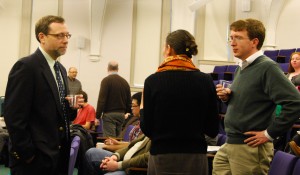The Rosenfield Program sponsored Bill Reisinger, University of Iowa Professor of Political Science, who came to speak on Russia’s imminent re-election of Vladimir Putin to President. Reisinger focuses on Russian politics, authoritarian regimes and democratization. Russia is experiencing a tense period of political drama as former President Vladimir Putin seeks re-election this Sunday. Putin, who was president from 2000-2008, stepped down to Prime Minister due to term limits while political ally Dimitri Medvedev stepped in as President. However, these political maneuverings have received criticism from both Russia and the international community. The S&B sat down with Reisinger to discuss the implications of Russia upcoming election and Putin’s grip on the Russian government.

Could you please tell us about the significance of the upcoming Russian election?
Even though not democratic, Russian is different from a fully authoritarian regime. It is not North Korea; it is not even the old Soviet Union. It is different in important ways because what those in power are trying to do is to let a large share of the public participate, express themselves, have a voice and go through the motions of what we would call “democratic procedures.” Nonetheless, it organizes things such that the possibility of throwing the incumbencies out of power is not there. You have to have elections, you have to have elected offices, you have to allow opposition parties, you have to go through a lot of procedures that democracies do. But you want to organize things in a way so that in practice, the outcome is guaranteed ahead of time.
If Putin gets elected this time, how will the Russian economy go? Is there going to be any substantial change?
The Russian economy will partly depend on how the energy prices go. I think Medvedev has been trying to modernize the economy for four years and he has not had a whole lot of success. Putin is less committed to modernization, which is what I think they really need. They can continue to get large revenue from selling their minerals and other energy resources and that may help their budget and allow them to invest in things that are good for the country. But if oil prices were to fall, or there were to be some competition from other powers, I think they face real danger. What Putin has done in his pre-election campaign is that he came out with an economic statement [saying,] “We are going to raise teachers’ salaries. We are going to meet all the retirement benefits,” and so on, which I do not think is realistic under current circumstances. He certainly won’t solve it. Putin wants to hold the political systems together, but they need to make changes, and be open to changes.
What would you say is the feeling of the Russian people for the legitimacy of the upcoming election process?
There have been surveys on the issue and 25-30% [of those] who responded say, “There is fraud, and I’m really upset about it.” There are about 40 percent who say, “Yes, we definitely think there’s fraud, we understand that, but basically things are going okay and it does not bother us much.” And the others say “No, we do not think there is fraud. Those [people who say there is fraud] are trouble makers, those are foreigners who say that and I just do not believe it.” What I find interesting is the middle group who says, “Yes, there’s fraud, but I do not care; Putin is going to stay in power anyways.”
Do people vote for Putin partly because there are no better alternatives?
Yes. The situation has gone better. Under Yeltsin the economy was horrible with depression, inflation and it was a very terrible time in the 1990s. Things have gotten better, partly because of Putin, partly not, so they can say, “Am I better off than I was 10 years ago? Yes.”




























































